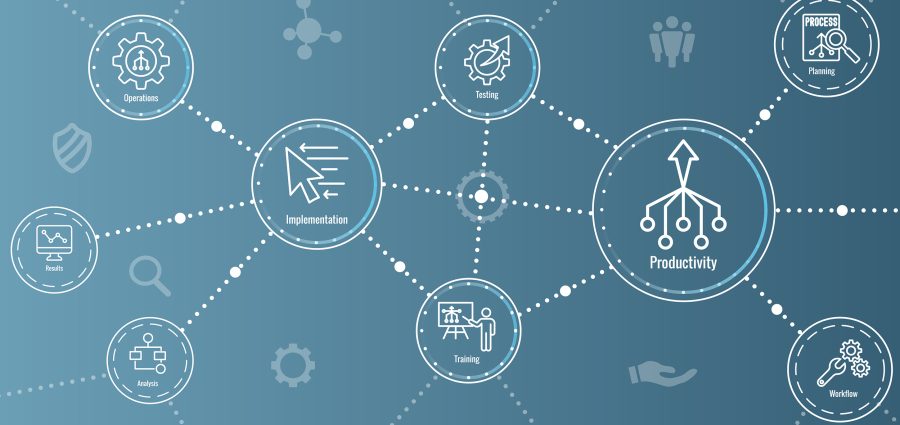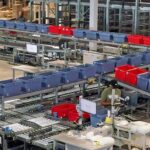If recruiting and retaining talent were easy, distributors would simply right-size their staffing to match the volume of tasks brought forth by product demand, supply chain conditions and the ways customers want to be served.
Sadly, that’s not the case, as evidenced by the commentary in the past few Baird-MDM Industrial Distribution Surveys. Amid a historically challenging labor situation where employees have more leverage than ever to job-hop and pick-and-choose the best situation for themselves, distributors today are often forced to make-do with the staff they have, and do it more efficiently. Along with upgrading systems in that effort, one of the main ways to do more with less is through automation.
The first recorded example of a completely automated industrial process — the ability to have continuous production without any human intervention — was Oliver Evans’ automatic flour mill in 1785. When we talk about business automation, it’s rise began in the 1960s with the introduction of ERP systems. Both sides have made leaps and bounds every decade since, but it seems distributors are only beginning to realize the benefits and capabilities of automation — both for physical processes and back-office functionality.
This was the subject of MDM’s latest webcast, “Where and How to Leverage Automation in 2023,” held Oct. 26 and now available on-demand. The one-hour program attacked what automation really means for distributors (since it can mean very different things to different organizations); the many levers of distribution where it can be applied; and where distributors can get started with it.
That latter piece was directly exemplified with the case study of Midwest Wheel Companies, a distributor of truck parts based in Des Moines, Iowa. The company has found significant benefits from automation implementation in recent years, including a 30% reduction in sales order process time via the use of machine learning and artificial intelligence to power parts recommendations that also improve customer service.
“Really, for us, it’s it’s anything that’s repetitive. You take a look at an area of business and you find a task with a process that can be done automatically because 90% of the time it’s done exactly the same way — that’s a prime target to automate,” said Steve McEnany, Vice President of Marketing and Technology of Midwest Wheel. “And really, that’s kind of our culture. As soon as we see something like that in the organization, we look to if we can make it automatic.”
McEneny, alongside co-panelists Kelly Squizzero and Will Quinn of Infor, detailed the various areas of a distribution business where automation makes life easier and makes employees more effective at their position. McEneny particularly noted how it’s a major help by automating a lot of little things on the sales side — where many distributors first look to get started with automation — that individually don’t take much time, but add up quickly.
Midwest Wheel worked with Infor to develop an AI application to analyze order data using machine learning, and with a recommendation engine embedded into the distributor’s sales order screen. It took only four weeks to deploy, and didn’t require any special skills or training from the company’s sales staff to begin using the app.
“We have over 40 salespeople in the central Midwest, so that’s a lot of individual processes involved,” McEnany said during the webcast. “If it comes down to any businesses up or down in a line, we now have the analytics tool to send alerts to let them (salespeople) know that, ‘hey, there’s an opportunity here that was possibly missed,’ or maybe something is going better — things like that.
McEneny detailed how, at Midwest Wheel, when a new customer account is opened, the new app sends an automated alert to both the associated salesperson and the customer letting them know the account has been created. Another automated alert sends after a first order has been placed.
“It’s those little things that aren’t really mundane, but it’s that hand holding that you’ve got to do with the customer, and you can really automate a lot of those steps,” McEneny said.
Implementing automation certainly isn’t like flipping a switch. Quinn and Squizzero detailed the self-auditing distributors should perform first to determine what processes are a fit to automate.
The potential time-saving benefits of automating repeitive tasks — whether physical or in sales/customer service processes — is well document and immediately comes to mind in any discussion of the technology. But lesser discussed is knowledge automation. A system that can instantly provide details of customer data, product information and inventory status is invaluable for any customer-serving position — empowering them to rapidly answer questions rather than have to go look for answers. The webcast panel tackled all those angles.
Their discussion is well worth an on-demand watch. I encourage you to check it out here.
Related Posts
-
The acqusitions help position Graybar as a leading automation and control distributor alongside its core…
-
The trading brand of RS Group plc, an omni-channel provider of products and service solutions,…
-
Applied continued its investment in the automation industry with its fourth acquisition in that market…






